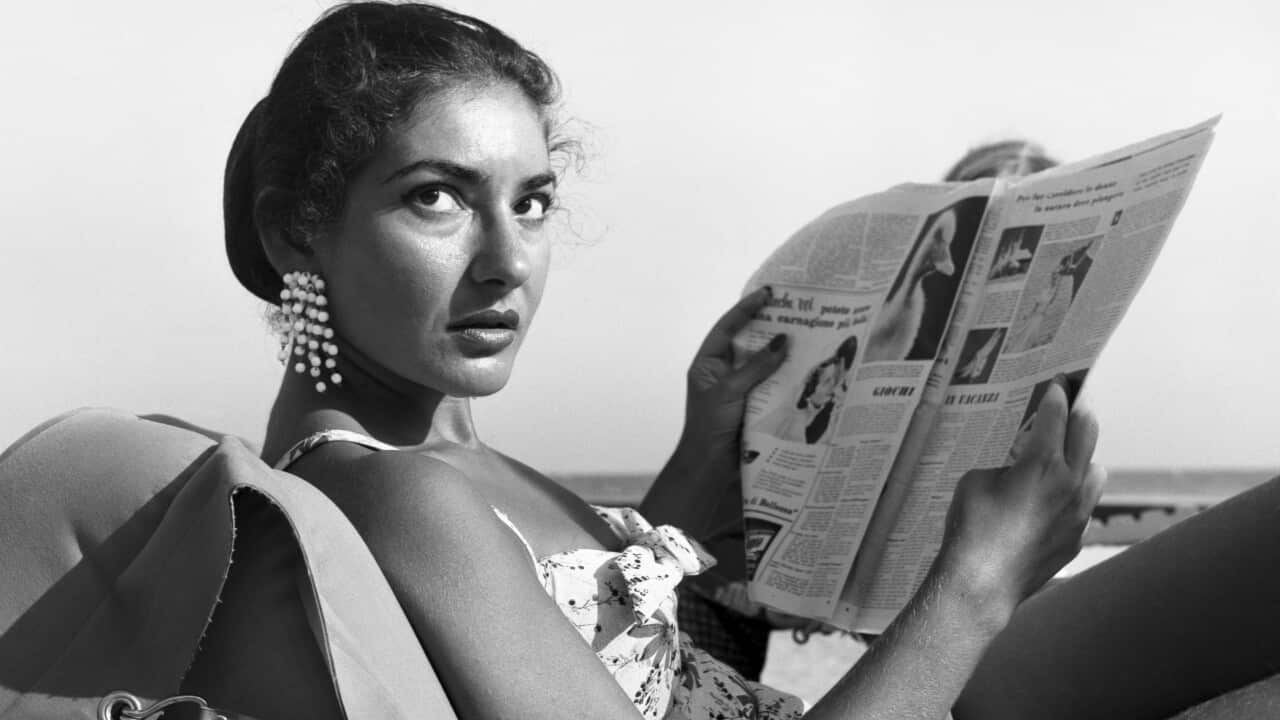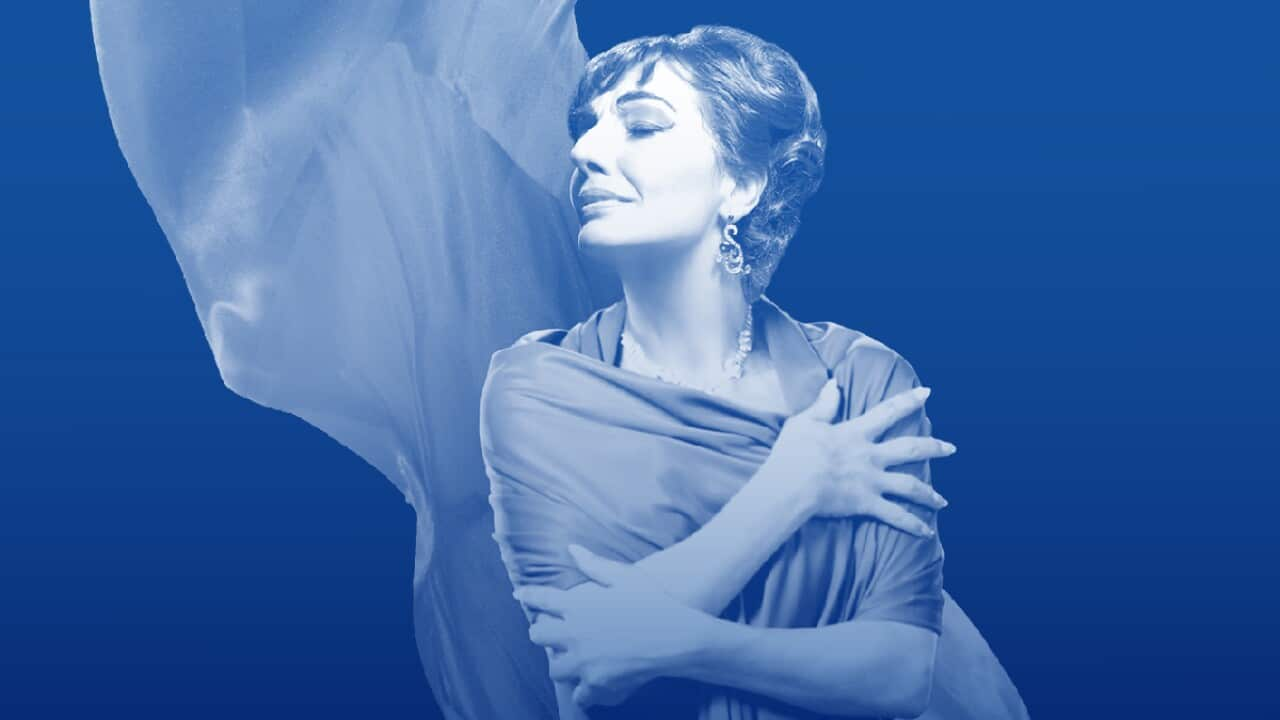

This article is more than 1 year old
La Divina: 100 Years Maria Callas
More than four decades after her death, Maria Callas maintains her position as one of the most popular and influential opera singers of the 20th century.
Published 1 December 2023 8:28pm
By Niko Plaskasovitis
Source: SBS
Image: American-born Greek opera singer, Maria Callas lying on an air mattress on Venice Lido beach, wearing a floral swimsuit and dangling earrings, reading a newspaper, Venice, 1950 (Photo by Archivio Cameraphoto Epoche/Getty Images) (Archivio Cameraphoto Epoche)
She was born in New York City on December 2, 1923 under the name Cecilia Sofia Anna Maria Kalogeropoulou to Greek immigrant parents, Evangelia (Litsas) Dimitriadis and Georgios Kalogeropoulos.
The artist started music lessons at an early age and at the age of 11, she won her first prize.
After the separation of her parents, Maria Callas, her mother and her sister moved to Athens in 1937, where she enrolled at the National Conservatory.
Her first role was "Saducha" in Mascani's opera "Cavalleria Rusticana", in a student performance at the conservatory.
In in 1939, Callas enrolled at the Athens Conservatory in the class of the singer, Elvira de Indalgo, where she had her first contact with the techniques and roles of Italian romantic opera.
After her training at the Athens Conservatory, Maria Callas appeared in various roles on the Greek opera music scene.

A farewell recital at the Royal Festival Hall by Maria Callas with Guiseppe Di Stephano. The two stand at the front of the stage to receive the applause of the audience. Flowers are strewn over the stage. (Photo by © Hulton-Deutsch Collection/CORBIS/Corbis via Getty Images) Credit: Hulton Deutsch/Corbis via Getty Images
From there, she changed her surname to Callas and began to pursue an international career.
Although the transition was not easy at first, after a successful audition she was commissioned to sing "Gioconda" in Amilcare Ponchielli's opera at the Arena in Verona.
In Verona, Maria Callas also found her first love, the industrialist Gianbatista Meneghini, to whom she married on 21 April 1949, despite being twice her age, with press reports of the time suggesting that she went ahead with the marriage to make up for her missing father figure.
With the support of Meneghini, Maria Callas' career took off and in 1951 she managed to go on stafe at "La Scala" in Milan.
In 1954, Callas underwent dietary therapy to enable her to perform roles not only with her voice but also with her presence.
After "La Scala", Callas found her footing at the Metropolitan Opera in New York in 1956.
There, the Greek diva pushed her terms to the limit, forcing director Randolph Bing to pay the largest sum ever given to an artist, while making him state that Callas' first MET performance was the most exciting night of his life.
Of course, her grueling diet and the pressure on her voice from her temperamental performances negatively affected the quality of her voice, gradually losing the high notes.
Callas returned to Greece in the summer of 1957, where she performed at the Herodeion as part of the Athens Festival. At the time there was a great outcry from the public and the "press" as she demanded the exorbitant sum of $9,000 - which was unrealistic for the time.
However, Maria Callas did not appear at the opening as planned, saying she lost part of her voice because of the climate. The performance went ahead at a later date.
LISTEN TO

"Με έπιασε μια βραχνάδα..." -Συνέντευξη της Κάλλας στα ελληνικά, στο ραδιοφωνικό πρόγραμμα του Αχιλλέα Μαμάκη.
04:32
The media, which helped spread her name, began to attack her. "This is a second-class artist who became an Italian thanks to her marriage", the Italian press commented.
These were not the first arrows that Callas received about her marriage to the Italian industrialist. In an interview in Greece, however, she had stated about her origin: "Her blood is Greek and no one can change that."
Apart from the great turmoil in her career, Callas faced many problems in her personal life as well. It was common knowledge that she had a stormy relationship with the Greek tycoon, Aristotle Onassis.

Aristotle Onassis, foreground with cigar, and Italian opera singer Maria Callas, center background, are shown at a restaurant party in Portofino, Italy, on July 10, 1961. They are cruising the Mediterranean on Onassis' yacht Christina, which is anchored off Portofino. (AP Photo) Source: AP / AP
In 1966 she renounces her American citizenship and receives the Greek citizenship.
This action formally dissolves her marriage to Meneghini but the proposal from Onassis never comes. The Greek tycoon married Jackie Kennedy in 1968, plunging Callas into depression.
She turned again to her career giving recitals and teaching and appeared in the film version of Euripides' Medea, directed by Pierre-Paolo Pasolini (1969), recording, teaching opera at the Juilliard School of Music in New York and giving recitals with the Italian tenor Giuseppe Di Stefano, who also had vocal problems.
Her last performance was in Sapporo, Japan on 11 December 1974.
Since then, Maria Callas shut herself up in her Paris apartment . The great diva passed away on the morning of September 16, 1977 at the age of 54.
Callas' work continues to inspire even now, more than 40 years after her death. Although her life had many stumbling blocks, Callas managed to carve her own path. A child of Greek immigrants, she captured the hearts of the world with her voice, lyricism and rare talent.
Share
